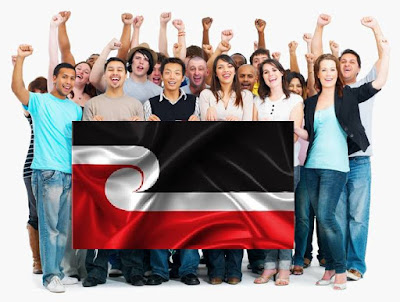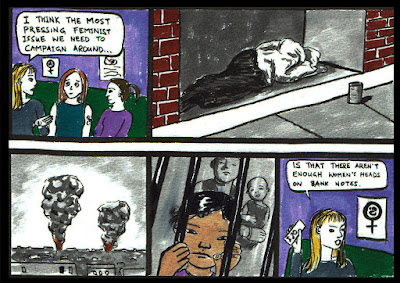Tau iwi People of Colour Supporting Tino Rangatiratanga
For a while now, some of
us part of Young Asian Feminists Aotearoa have been having discussions about
decolonization what it means for us as Asians and tau iwi people of colour to
be living on stolen land. If you’ve seen that banner “Asians Supporting Tino
Rangatiratanga” at protests, that’s us!
Before I start, I just
want to say that I’ve been feeling a bit conflicted speaking at this forum
after experiences that made me think long and hard about the barriers for tau
iwi people of colour to engage with issues of colonization in Aotearoa
especially when the conversation is controlled and mediated by Pākehā and the
normative discourse is framed by biculturalism. I really want to challenge the
view that this is just about Māori and Pākehā. In that framework, tau iwi
people of colour are either treated as honorary Pākehā or non-existent in this
country. By tau iwi people of colour, I mean settlers and migrants who are
racialised, generally of non-European descent. We also exist in this country,
and particularly this city. In many ways, we are also complicit in the colonial
relationships and structures set up before, during and after our arrival. I
want to explore what it means for us to support Tino Rangatiratanga and how
they might be similar or different to the role of Pākehā.
I want to start off with answering the question
of “Nō hea au?” Where am I from? Although that’s usually quite a loaded question
white people ask me all the time for being visibly Asian, where I’m from is
significant for this discussion. Unlike tau iwi who are Pākehā, my ancestry is
not in Europe… but this land known to English-speakers as China, a massive
country now imagined as a superpower or a source of cheap labour. Specifically,
I was born in Tianjin a port city not far from Beijing. This city, my hometown
has a colonial history of occupation by 8 different nation-states from the 19th
to 20th century, but western cultural imperialism is still happening
today through the importation of dairy products for example. My grandparents
still remember the days of Japanese invasion and occupation characterized by
torture, mass murder, pillaging and burning villages to the ground as well as
vivisection - that is - medical experimentation, on Chinese people. But people in
my ethnic group, known as the Han Chinese, have been both colonized and
colonisers in different times and places. Taiwan, Tibet, Urumqi and Singapura
are some places currently under Han Chinese occupation and rule. I support the
tino rangatiratanga of the indigenous people of those lands as well, although I
can’t say I understand the context that well having never been to any of those
places. I’ve grown up most of my life in Tāmaki Makaurau, Aotearoa where racism
and xenophobia against Asians in the 90s was pretty visible and as in your face
as an egg in your face walking home from school and your parents working low
wage jobs because they can’t speak English. I didn’t start really understanding
the history of this land until my later teen years, which I didn’t learn
through the school system but through education on the streets, at hui and
protests. So I’m supporting tino rangatiratanga with this history.
So with this history in
front of me, I think the distinction between tau iwi people of colour and
Pākehā becomes important in the ways we support tino rangatiratanga and the
role we might play in the movement to decolonise. This category extends to
other migrants and settlers who are not Pākehā, including those who are
indigenous to other lands, migrants or refugees who have been dispossessed by
war, occupation or rampant capitalism as well as those who were privileged
enough to migrate as a skilled migrant. So this is quite a broad category of
people with a lot of internal inequalities based on class, religion, gender and
ethnicity. I don’t claim to speak for all tau iwi people of colour, but I do
think it’s a useful category to name non-Pākehā groups that are also racialised
and experience racism in this colonial settler society but are not Māori.
Whatever the case of how and why we’re here, our visa status or citizenship has
been granted to us by a colonial settler state that stole the land and
established power to make decisions of who does and doesn’t have the right to
be here. We weren’t invited here by tangata whenua but
allowed/tolerated/permitted to be here by the thieves of their land, so
immediately the relationship is fairly fraught because we’re part of a settler
population that further entrenches the dispossession of tangata whenua.
At the same time, while
many of us have certain privileges as settlers here, racism and xenophobia can
make it hard to access appropriate housing, employment and allows the mainstream
to treat us as secondary citizens or residents or otherwise as ‘illegal
aliens’. Or we might be economically included but socially excluded in the
imagination of the nation-state. There are different kinds of racisms that are
specific to each of our different ethnicities, but being tau iwi here means
that we’ve come into a system of colonial relationships and a country where the
wealth is based on colonisation and domination of tangata whenua.
With this fraught
relationship in mind, I think it’s important to recognize the divide and rule
tactics used and circulated that shapes relationships between tau iwi people of
colour and Māori and our perceptions of each other. Biculturalism and
multiculturalism often get talked about as opposing visions of cultural
politics, but neither of which really question the centrality and dominance of
Pākehā culture. Biculturalism tends to shut non-Pākehā tau iwi out and
meanwhile multiculturalism gets used to undermine tino rangatiratanga (see
Brash’s Orewa speech). Token knowledge of Maori culture or reo sometimes gets
used by Pākehā to indigenize themselves and further exclude tau iwi people of
colour, to ‘one-up new migrants’. I see this as a form of cultural
appropriation for other racist agendas.
Migrants of colour and
Māori get pitted against each other in this way as if anti-racist liberation is
a zero-sum game. Often migrant knowledge of these issues or of Māori culture
have been mediated by racist stereotypes in the Pākehā media then translated
and filtered through in our languages. We’ve rarely had opportunities to build
links and alliances with each other without Pākehā people mediating those
spaces. So we’ve had to build and organize those spaces ourselves and want to
continue building those links and sorting through the tensions that might exist
between the goals of tino rangatiratanga and migrant justice. In YAFA, we’ve
have looked at how immigrants of colour in Turtle Island or what’s known as
Canada have bridged those tensions and it seemed like the conversations there
have been happening on a wider scale and stronger links have been forged
between migrant justice and indigenous struggles. I’m really interested in how
that can be done here.
Many of us want to make
sense of our place in this and want to stop participating in ongoing
injustices.
My main message today is
that there are tau iwi people of colour supporting tino rangatiratanga despite
the barriers. And it’s not necessarily a new thing. We were there on the hikoi
against the Foreshore and Seabed bill, we were there in solidarity when the
anti-terror raids happened on October 15th 2007 and throughout the
court process, supported the protests against the deletion of Māori seats in
the creation of the supercity, marched against asset sales despite the xenophobia
and fears of foreign (i.e. Chinese) ownership as if land in this country isn’t
already in non-Māori ownership.
More tau iwi people of
colour need to play a part in supporting tino rangatiratanga otherwise by
default we’re playing a role that is complicit and maintains the racist
structures of this colonial settler society. Beyond having a common oppressor,
I think it’s important for tau iwi people of colour to build meaningful
relationships with tangata whenua to tautoko the movement for tino rangatiratanga
and mana motuhake from our own cultural frameworks. By questioning our own
complicities and seeing through the divide and rule tactics of the colonial
settler system, as tau iwi people of colour, we can seek strategies to disrupt
and resist settler colonialism, because there can be no justice for anyone on
stolen land including migrants without achieving tino rangatiratanga and mana
motuhake for tangata whenua. I imagine and hope that in the not too distant
future, we can have these conversations and discussion on the terms of tangata
whenua and in te reo Māori rather than te reo Pākehā where mātauranga Māori is
centred rather than marginalised or tokenised.
We’re still figuring out
our role in the struggle for tino rangatiratanga and have a lot more to learn
but we want tangata whenua to know that we are here in solidarity and other tau
iwi people of colour to know that it’s important for us to also engage.
Some of us have some
projects planned as well: one is a zine about people of colour settlers and
complicities in colonialism, which is aiming for transnational conversations
between and within colonial settler societies including Aotearoa, Australia and
Turtle Island. Shasha Ali, who is also part of YAFA is also planning a
commemoration for the October 15th raids to involve performance
artists and musicians for shows in Poneke and Tamaki-Makaurau. Get in touch if
you want to be involved.


There are people who believe that Maori originated from China, so the perceived distance between actual tangata whenua and 'tau iwi' may only be superficial!
ReplyDelete[url]http://news.bbc.co.uk/2/hi/asia-pacific/148892.stm[/url]
Tautoko! Good to read your blog. A similar analysis led a group of us to form a Jewish Feminist Group for Maori Sovereignty in the 1980s. We make things richer when we recognise the complexity and variety of streams of experience that make up non-Maori/tau iwi life in Aotearoa. Honouring Te Tiriti o Waitangi is not a simple dialogue but a rich sharing of broad experience, as long as we all stand tall in our own whakapapa. Perhaps it's only possible to respond to the history of colonisation from our own cultural perspective. Jane and Miriam
ReplyDeleteThe operative words in that comment by the Jewish lady above are ''the 1980s''. That is 30 years ago. The world has moved on.
ReplyDelete''Perhaps it's only possible to respond to the history of colonisation from our own cultural perspective''. This is good advice. Presuming to speak for Maori is patronising and naive.
ReplyDeletetena koe e hoa, ka rawe ke koe o korero, tautoko.
ReplyDeleteI've always known this but quiver at the realization Asian people don't always share the same ideas or the lack of education from an Asian majority point of view.
ReplyDeletequarligaste Alejandro Cox https://wakelet.com/wake/pJHDNqJ46fs9pL0txIV03
ReplyDeleteinfelrabor
erinVcomme Darrell Orlando UltraISO
ReplyDeleteMicrosoft Visio Professional
Everest
chihojehot
sumplatlen-ta Donald Robinson Download
ReplyDeleteLink
uneninel
Thank you for beeing you
ReplyDelete